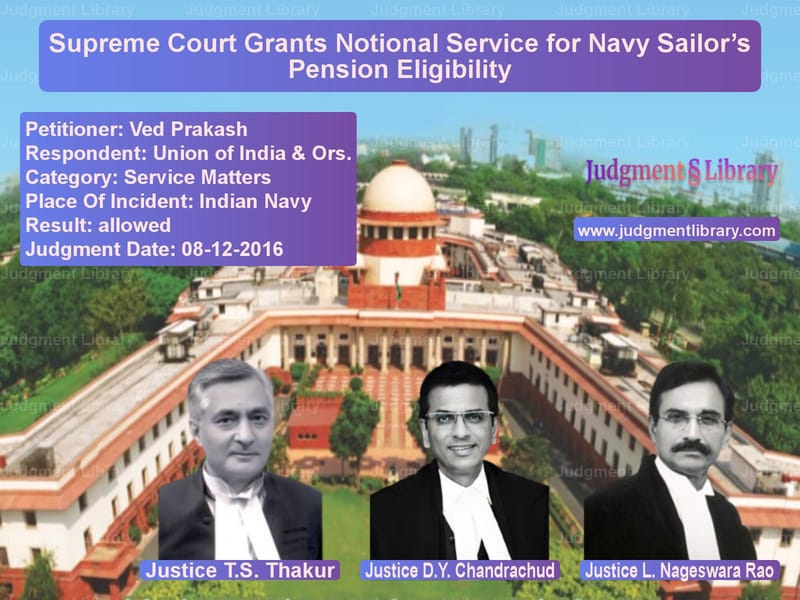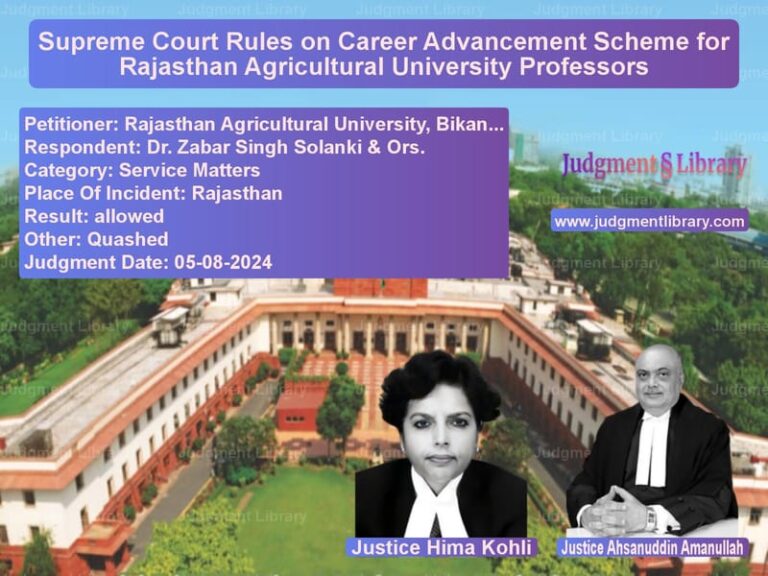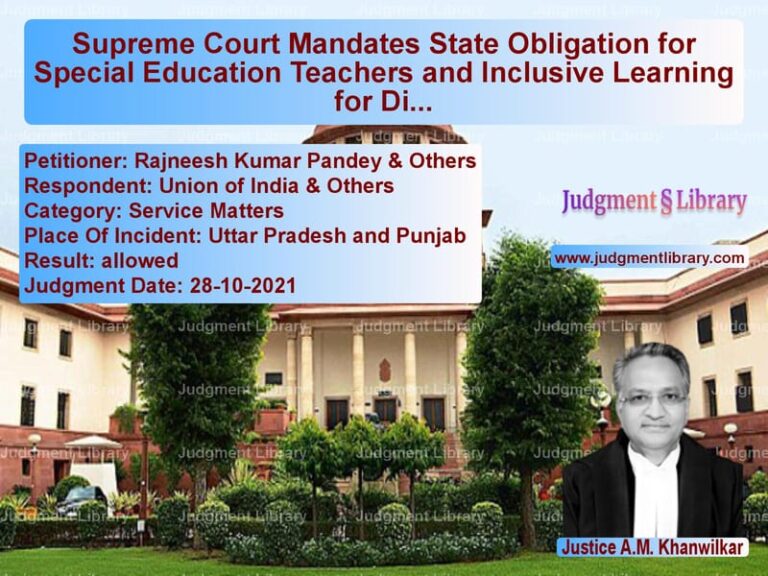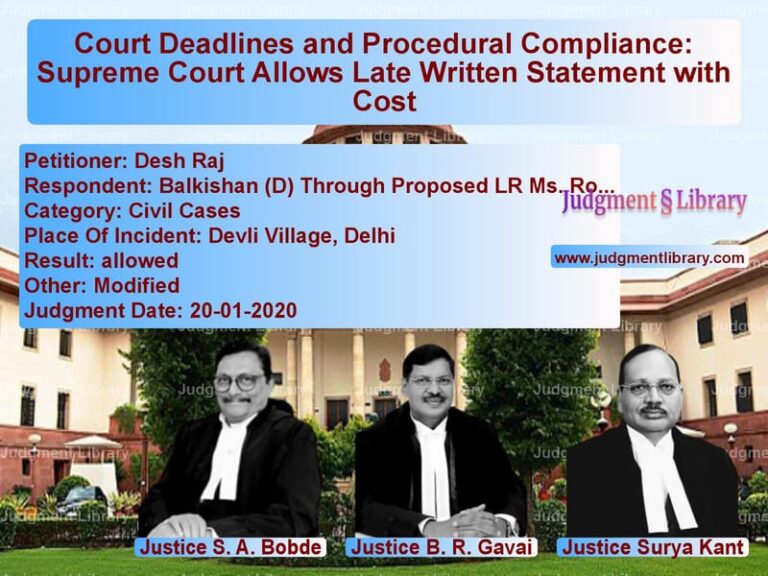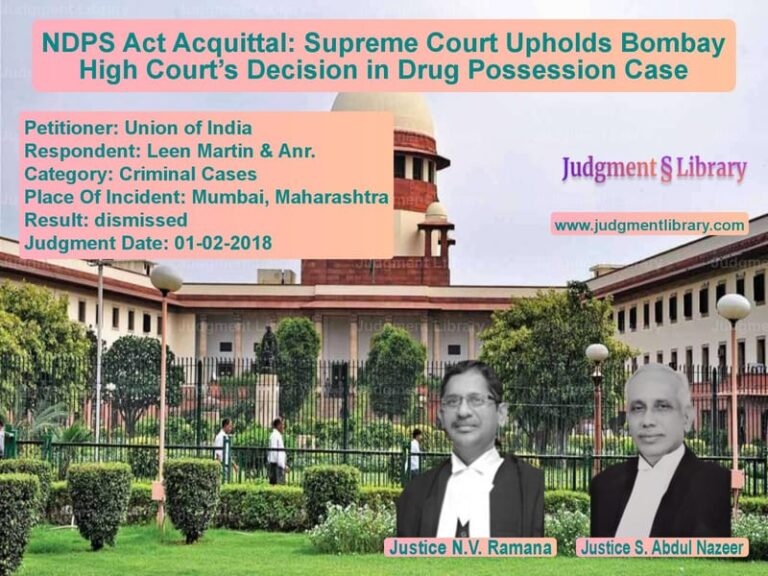Supreme Court Grants Notional Service for Navy Sailor’s Pension Eligibility
The case of Ved Prakash vs. Union of India & Ors. involved a legal battle over the re-engagement of a sailor in the Indian Navy and his right to pensionary benefits. The Supreme Court, in its judgment delivered on December 8, 2016, ruled in favor of the petitioner by granting him notional service of five years, thereby making him eligible for pension. This ruling highlighted crucial aspects of service law, particularly regarding the re-engagement policies of defense personnel.
Background of the Case
The appellant, Ved Prakash, joined the Indian Navy on August 1, 2002, as a Direct Entry Diploma Holder (D.E.D.H.) with an initial engagement of ten years as an Electrical Artificer 4th Class (EAR-4). In 2005, he suffered an injury while playing volleyball, leading to his placement in a Low Medical Category (S2 A2 PMT). Due to this, his application for re-engagement for five years had to be processed through the Headquarters Western Naval Command.
His Commanding Officer at INS Vindhyagiri recommended him for re-engagement, commending his technical expertise, leadership qualities, and service commitment. The recommendation stated:
“Despite joining the ship recently, he has proved to be instrumental in executing critical defect rectifications onboard. The sailor has gained confidence of his superiors to single-handedly resolve technical defects.”
However, the Bureau of Sailors, Mumbai, approved only a two-year re-engagement instead of five years. The reasons cited were:
- He had been in medical category S3 A2 from 2006 to 2009 and had only recently been upgraded to S2 A2 (PMT).
- His service in Afloat Billets (sea duty) was limited, and he had only been placed onboard in August 2010.
- His past record indicated a lack of discipline and conduct issues.
- His CHEAR (Q) training course had been canceled multiple times due to low medical category and personal reasons.
Ved Prakash challenged this decision, seeking a full five-year re-engagement period, arguing that his medical condition did not disqualify him and that he had consistently performed well.
Legal Issues in Question
- Whether the Navy’s decision to re-engage Ved Prakash for only two years instead of five was legally justified.
- Whether the refusal to extend his service violated re-engagement policies.
- Whether he was entitled to pensionary benefits despite not completing the required 15 years of service.
Petitioner’s (Ved Prakash) Arguments
- The Navy Order 02/07 did not explicitly restrict his re-engagement for five years.
- His medical category S2 A2 (PMT) was sufficient for continued service, and he was fit for duty.
- His performance was consistently rated as “Very Good”, and his technical skills were commended by superiors.
- The Bureau of Sailors’ decision lacked transparency and was not based on any specific regulations.
Respondents’ (Union of India) Arguments
- The petitioner had no right to claim re-engagement for five years, as re-engagement is subject to service needs.
- He had only served one year at sea, which was insufficient for full re-engagement.
- He had failed to complete the CHEAR (Q) training course, making him less qualified for continued service.
- His two-year re-engagement period was a reasonable extension, and he could have applied for further extension later.
Supreme Court’s Judgment
The Supreme Court, comprising Chief Justice T.S. Thakur, Justice D.Y. Chandrachud, and Justice L. Nageswara Rao, ruled in favor of the petitioner, making the following key observations:
- The Bureau of Sailors had applied the Navy Order inconsistently and had failed to provide clear justification for limiting the re-engagement to two years.
- The petitioner had consistently received high performance ratings and had been strongly recommended by his Commanding Officer.
- The petitioner’s low medical category status was not a valid reason for denying a full re-engagement period since he had been upgraded to S2 A2 (PMT).
- The petitioner had been deprived of the opportunity to complete 15 years of service, which would have entitled him to pensionary benefits.
- The Court directed that he be granted notional service of five years to make him eligible for pension but denied salary and allowances for the same period.
Key Legal Takeaways
- Re-engagement Policy Clarity: The Court emphasized that re-engagement decisions should be based on clear and transparent guidelines.
- Service Benefits Protection: If an administrative decision deprives an employee of pension eligibility, corrective action should be taken.
- Medical Fitness Consideration: The Court ruled that an upgrade in medical category should be taken into account when assessing re-engagement eligibility.
- Notional Service Concept: The judgment established that courts can grant notional service to rectify unfair employment practices.
Conclusion
The Supreme Court’s ruling in Ved Prakash vs. Union of India sets a critical precedent for defense personnel seeking fair re-engagement and pension eligibility. By granting notional service, the Court ensured that the petitioner was not unfairly deprived of his pension. This case reinforces the principle that service members should not be arbitrarily denied benefits due to inconsistent administrative decisions.
Don’t miss out on the full details! Download the complete judgment in PDF format below and gain valuable insights instantly!
Download Judgment: Ved Prakash vs Union of India & Ors Supreme Court of India Judgment Dated 08-12-2016.pdf
Direct Downlaod Judgment: Direct downlaod this Judgment
See all petitions in Pension and Gratuity
See all petitions in Judgment by T.S. Thakur
See all petitions in Judgment by Dhananjaya Y Chandrachud
See all petitions in Judgment by L. Nageswara Rao
See all petitions in allowed
See all petitions in supreme court of India judgments December 2016
See all petitions in 2016 judgments
See all posts in Service Matters Category
See all allowed petitions in Service Matters Category
See all Dismissed petitions in Service Matters Category
See all partially allowed petitions in Service Matters Category

